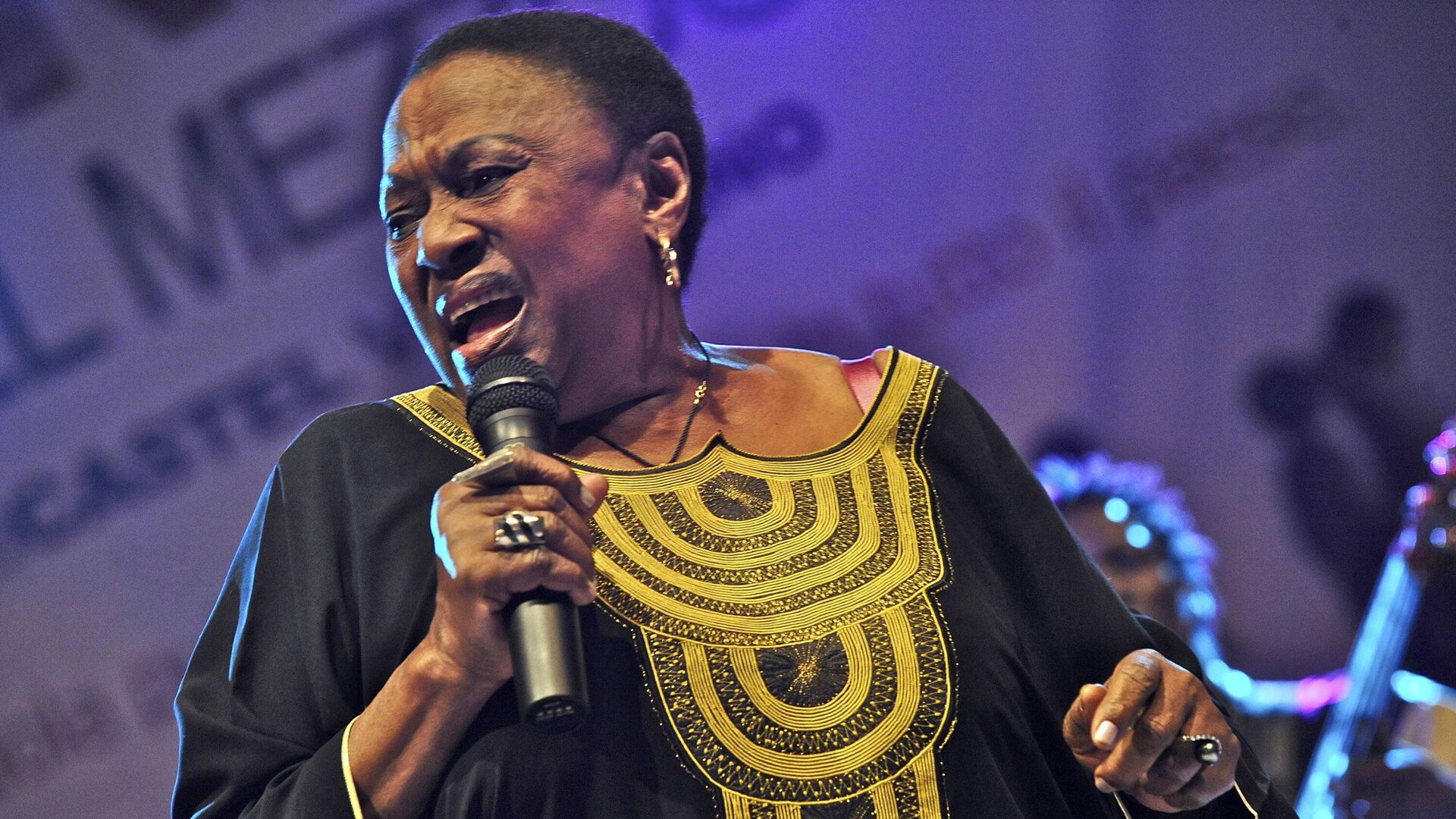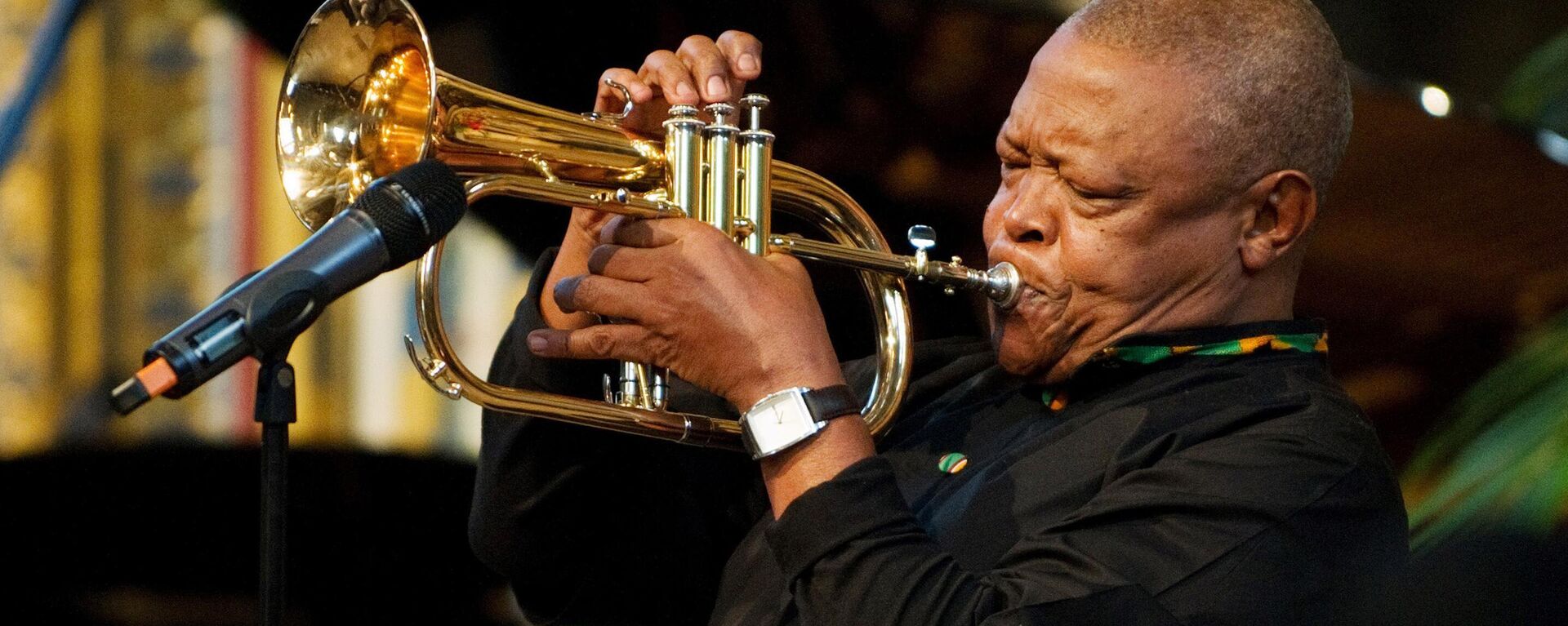https://en.sputniknews.africa/20240304/miriam-makebas-92nd-birth-anniversary-mama-africas-resilient-voice-bridging-cultures-1065374839.html
Miriam Makeba's 92nd Birth Anniversary: Mama Africa's Resilient Voice Bridging Cultures
Miriam Makeba's 92nd Birth Anniversary: Mama Africa's Resilient Voice Bridging Cultures
Sputnik Africa
Zenzile Miriam Makeba, affectionately known as Mama Africa, was a beacon of strength, talent, and activism. Born on March 4, 1932, in Johannesburg, South... 04.03.2024, Sputnik Africa
2024-03-04T14:37+0100
2024-03-04T14:37+0100
2024-03-04T14:37+0100
sub-saharan africa
south africa
united states (us)
johannesburg
africa in details
apartheid
anti-apartheid struggle
singers
music
music industry
https://cdn1.img.sputniknews.africa/img/07e8/03/04/1065375124_0:0:3001:1688_1920x0_80_0_0_56e939308f9435e058dcfc23b3ce94c4.jpg
Miriam Makeba’s roots were deeply intertwined with her Swazi and Xhosa heritage. Her father’s untimely death forced her into the workforce as a child. Yet, her remarkable vocal talent could not be stifled. In the 1950s, she stepped onto the professional stage, lending her voice to various groups like the Cuban Brothers, the Manhattan Brothers, and the all-woman ensemble, the Skylarks. Their music blended jazz, traditional African melodies and Western influences.In 1959, Makeba’s life took a pivotal turn when she appeared in the anti-apartheid film "Come Back, Africa". This role catapulted her onto the international stage, leading to performances in Venice, London, and New York City. It was in London that she crossed paths with the legendary American singer Harry Belafonte, who became her mentor and collaborator.Makeba’s move to New York City marked a turning point. Her soul-stirring voice resonated with audiences, and in 1960, she released her first solo album. Tragically, when she sought to return to South Africa for her mother’s funeral, the apartheid government barred her entry. Undeterred, she continued her musical journey in the United States.Her hit song "Pata Pata" (1967) became an anthem, capturing the rhythm of liberation. Alongside Belafonte, she received a Grammy Award for their collaborative album "An Evening with Belafonte/Makeba". But Makeba’s impact extended beyond music.She testified against the South African government at the United Nations, using her voice to denounce apartheid. In 1968, she married Stokely Carmichael, a leader of the Black Panther Party. Their union faced opposition, leading to the revocation of her US visa. Forced to relocate to Guinea, she continued performing across Africa.When apartheid started crumbling in 1990, Makeba returned to her beloved South Africa. Her music remained a powerful force, and she collaborated with such luminaries as Nina Simone and Dizzy Gillespie. Her activism continued, and she even appeared in the movie "Sarafina!" (1992), about a young black South African woman fighting for freedom during apartheid.On November 9, 2008, tragedy struck during a concert in Italy. Miriam Makeba, still singing with unwavering passion, suffered a heart attack and left this world at the age of 76. Her legacy, however, lives on — a testament to her courage, her fight against injustice, and her timeless music.Miriam Makeba was among the first African musicians to receive international recognition. She brought African music to the Western audience, popularizing the world music and Afropop genres.As we celebrate her 92nd birth anniversary, let us remember her as more than an icon — she was a fierce advocate for equality, a bridge between cultures and the embodiment of resilience.
https://en.sputniknews.africa/20230417/hugh-saw-it-coming-sa-jazz-legend-masekelas-nephew-on-westernization-of-african-culture-1058601166.html
south africa
united states (us)
johannesburg
Sputnik Africa
feedback@sputniknews.com
+74956456601
MIA „Rossiya Segodnya“
2024
Muhammad Nooh Osman
https://cdn1.img.sputniknews.africa/img/07e7/04/0a/1058467512_0:0:1280:1280_100x100_80_0_0_ec723833bcbfcaed2e21952965ad99e4.jpg
Muhammad Nooh Osman
https://cdn1.img.sputniknews.africa/img/07e7/04/0a/1058467512_0:0:1280:1280_100x100_80_0_0_ec723833bcbfcaed2e21952965ad99e4.jpg
News
en_EN
Sputnik Africa
feedback@sputniknews.com
+74956456601
MIA „Rossiya Segodnya“
Sputnik Africa
feedback@sputniknews.com
+74956456601
MIA „Rossiya Segodnya“
Muhammad Nooh Osman
https://cdn1.img.sputniknews.africa/img/07e7/04/0a/1058467512_0:0:1280:1280_100x100_80_0_0_ec723833bcbfcaed2e21952965ad99e4.jpg
south africa, united states (us), johannesburg, africa in details, apartheid, anti-apartheid struggle, singers, music, music industry, grammy awards, culture
south africa, united states (us), johannesburg, africa in details, apartheid, anti-apartheid struggle, singers, music, music industry, grammy awards, culture
Miriam Makeba's 92nd Birth Anniversary: Mama Africa's Resilient Voice Bridging Cultures
Muhammad Nooh Osman
Writer/Editor
Zenzile Miriam Makeba, affectionately known as Mama Africa, was a beacon of strength, talent, and activism. Born on March 4, 1932, in Johannesburg, South Africa, her life journey transcended borders, leaving an indelible mark on the world.
Miriam Makeba’s roots were deeply intertwined with her Swazi and Xhosa heritage. Her father’s untimely death forced her into the workforce as a child. Yet, her remarkable vocal talent could not be stifled.
In the 1950s, she stepped onto the professional stage, lending her voice to various groups like the Cuban Brothers, the Manhattan Brothers, and the all-woman ensemble, the Skylarks. Their music blended jazz, traditional African melodies and Western influences.
In 1959, Makeba’s life took a pivotal turn when she appeared in the
anti-apartheid film "
Come Back, Africa". This role catapulted her onto the
international stage, leading to performances in Venice, London, and New York City. It was in London that she crossed paths with the legendary American singer
Harry Belafonte, who became her mentor and collaborator.
Makeba’s move to New York City marked a turning point. Her soul-stirring voice resonated with audiences, and in 1960, she released her first solo album. Tragically, when she sought to return to South Africa for her mother’s funeral, the apartheid government barred her entry. Undeterred, she continued her musical journey in the United States.
Her hit song "
Pata Pata" (1967) became an anthem, capturing the rhythm of liberation. Alongside Belafonte, she
received a Grammy Award for their collaborative album "
An Evening with Belafonte/Makeba". But Makeba’s impact extended beyond music.
She testified against the South African government at the United Nations, using her voice to denounce apartheid. In 1968, she married Stokely Carmichael, a leader of the Black Panther Party. Their union faced opposition, leading to the revocation of her US visa. Forced to relocate to Guinea, she continued performing across Africa.
When apartheid started
crumbling in 1990, Makeba returned to her beloved South Africa. Her music remained a powerful force, and she collaborated with such luminaries as
Nina Simone and
Dizzy Gillespie. Her activism continued, and she even appeared in the movie "
Sarafina!" (1992), about a young black South African woman fighting for freedom during apartheid.
On November 9, 2008, tragedy struck during a concert in Italy. Miriam Makeba, still singing with unwavering passion, suffered a heart attack and left this world at the age of 76. Her legacy, however, lives on — a testament to her courage, her fight against injustice, and her timeless music.
Miriam Makeba was among the first African musicians to receive international recognition. She brought African music to the Western audience, popularizing the world music and Afropop genres.
As we celebrate her 92nd birth anniversary, let us remember her as more than an icon — she was a fierce
advocate for equality, a bridge between cultures and the embodiment of resilience.



